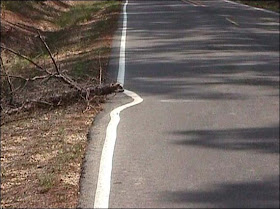If someone asked you the definition of "doing the right thing", where would your reasoning come from? Take a look at the picture to the right. Notice how the permanent boundary marking is subject to a temporary twig which has fallen beside the road. Soon the twig will be gone leaving a permanent reminder of a temporary obstruction. Many choose to live their life in this manner, a life defined by present circumstances and guided by a relative moral compass. They are clouds without rain, blown along by the wind. Is there a better way?
I invite you into the minds of four great conservative thinkers as they peer behind this seemingly thin veil of ethical contradiction and observe the current state and direction of the United States of America.
Is the New Morality Destroying America?
 By
Clare Boothe Luce, American playwright, legislator, and diplomat.
By
Clare Boothe Luce, American playwright, legislator, and diplomat.
But
what history does tell us is that when the majority of the people
begin to abandon their version of the universal morality, their
society sooner or later begins to collapse, and is eventually
destroyed. Unfortunately in America today there are many individuals
who have renounced traditional morality for what has come to be
called "relative morality" or "situational ethics."
("It may be wrong in general, but my situation is different, so
for me it's right.")
Who
gets to make the rules?
By
Cal Thomas, conservative
American syndicated columnist.  If
God is not God and if man says God didn't say what He has said, then
what standard is to be used to judge anything? It is more than a
slippery slope. It is slippery theology with potential consequences
that are eternal. Who gets to decide, God or man? If man, then man
becomes God and God is diminished, at least in man's eyes.
If
God is not God and if man says God didn't say what He has said, then
what standard is to be used to judge anything? It is more than a
slippery slope. It is slippery theology with potential consequences
that are eternal. Who gets to decide, God or man? If man, then man
becomes God and God is diminished, at least in man's eyes.
By Don Wildmon, founder of the American Family Association.
But
the truth is that all our fine talk about personal freedoms in the
U.S. can be nullified by the freedom we take with the moral laws of
God. … Our consciences have become blunted and dulled with an
overdose of pseudosophistication and broad-mindedness. We have become
so tolerant of sin and sinfulness that we have lost our capacity to
protest and rebel against plain indecency and moral rottenness.
Ethics Codes Don't make People
Ethical
By Michael
Josephson, founder and president of Josephson Institute.
"You
see, there are two aspects to ethics: discernment (knowing right from
wrong) and discipline (having the moral willpower to do what's
right). A code can help define what's right and acceptable and
provide a basis for improving sanctions on those who don't follow it.
But unless it reinforces an established ethical culture, it won't do
much to assure that people do what's right.



No comments:
Post a Comment
Thanks for your comments!